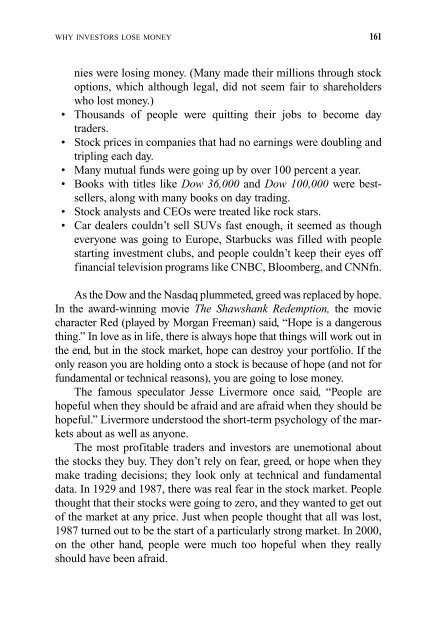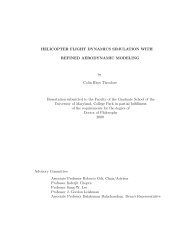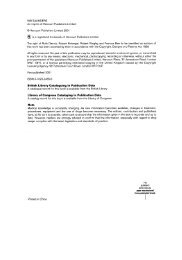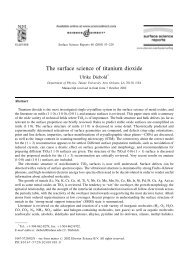Understanding Stocks
Understanding Stocks
Understanding Stocks
Create successful ePaper yourself
Turn your PDF publications into a flip-book with our unique Google optimized e-Paper software.
WHY INVESTORS LOSE MONEY 161<br />
nies were losing money. (Many made their millions through stock<br />
options, which although legal, did not seem fair to shareholders<br />
who lost money.)<br />
• Thousands of people were quitting their jobs to become day<br />
traders.<br />
• Stock prices in companies that had no earnings were doubling and<br />
tripling each day.<br />
• Many mutual funds were going up by over 100 percent a year.<br />
• Books with titles like Dow 36,000 and Dow 100,000 were bestsellers,<br />
along with many books on day trading.<br />
• Stock analysts and CEOs were treated like rock stars.<br />
• Car dealers couldn’t sell SUVs fast enough, it seemed as though<br />
everyone was going to Europe, Starbucks was filled with people<br />
starting investment clubs, and people couldn’t keep their eyes off<br />
financial television programs like CNBC, Bloomberg, and CNNfn.<br />
As the Dow and the Nasdaq plummeted, greed was replaced by hope.<br />
In the award-winning movie The Shawshank Redemption, the movie<br />
character Red (played by Morgan Freeman) said, “Hope is a dangerous<br />
thing.” In love as in life, there is always hope that things will work out in<br />
the end, but in the stock market, hope can destroy your portfolio. If the<br />
only reason you are holding onto a stock is because of hope (and not for<br />
fundamental or technical reasons), you are going to lose money.<br />
The famous speculator Jesse Livermore once said, “People are<br />
hopeful when they should be afraid and are afraid when they should be<br />
hopeful.” Livermore understood the short-term psychology of the markets<br />
about as well as anyone.<br />
The most profitable traders and investors are unemotional about<br />
the stocks they buy. They don’t rely on fear, greed, or hope when they<br />
make trading decisions; they look only at technical and fundamental<br />
data. In 1929 and 1987, there was real fear in the stock market. People<br />
thought that their stocks were going to zero, and they wanted to get out<br />
of the market at any price. Just when people thought that all was lost,<br />
1987 turned out to be the start of a particularly strong market. In 2000,<br />
on the other hand, people were much too hopeful when they really<br />
should have been afraid.

















